Related Research Articles
The Green Party of Aotearoa New Zealand,commonly known as Green or the Greens,is a green and left-wing political party in New Zealand. Like many green parties around the world,it has four pillars. The party's ideology combines environmentalism with left-wing and social democratic economic policies,including well-funded and locally controlled public services within the confines of a steady-state economy. Internationally,it is affiliated with the Global Greens.

Nándor Steven Tánczos is a New Zealand social ecologist,researcher,educator,activist and political commentator. He is currently a councillor in the Whakatāne District Council. He is also co-director of He Puna Manawa social and political change agency.

Metiria Leanne Agnes Stanton Turei is a New Zealand academic and former politician. She was a Member of Parliament from 2002 to 2017 and the female co-leader of the Green Party of Aotearoa New Zealand from 2009 to 2017. Turei resigned from the co-leader position on 9 August 2017 amid a political controversy arising from her admission to lying to the Ministry of Social Development to receive higher payments when she was on the Domestic Purposes Benefit and later,to being enrolled to vote in an electorate where she was not eligible when she was 23.

Aotearoa Legalise Cannabis Party (ALCP),also known as the Cannabis Party,is a political party in New Zealand. It is dedicated to the legalisation of cannabis for medical,recreational and industrial use. It was founded in 1996 and has stood in every general election since,but has never won representation in Parliament. Several of its members have gone on to political success after leaving the party.
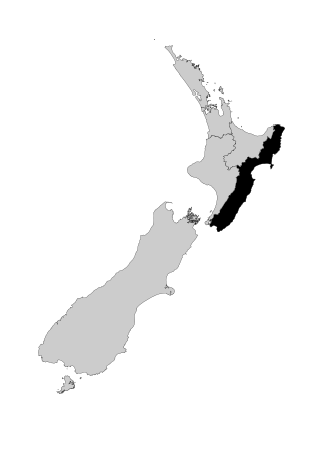
Ikaroa-Rāwhiti is a New Zealand parliamentary Māori electorate that was formed for the 1999 election. It covers the eastern North Island from East Cape south through Hawke's Bay and the Wairarapa to Wainuiomata and most of the Hutt Valley,but not southern Lower Hutt or Wellington City.

The use of cannabis in New Zealand is regulated by the Misuse of Drugs Act 1975,which makes unauthorised possession of any amount of cannabis a crime. Cannabis is the fourth-most widely used recreational drug in New Zealand,after caffeine,alcohol and tobacco,and the most widely used illicit drug. In 2001 a household survey revealed that 13.4% of New Zealanders aged 15–64 used cannabis. This ranked as the ninth-highest cannabis consumption level in the world.

David James Clendon is a New Zealand former politician. He was a list Member of Parliament in the New Zealand House of Representatives for the Green Party of Aotearoa New Zealand from 2009 until 2017. He later served one term on the Far North District Council from 2019 to 2022.
Dakta Green,formerly Kenneth Morgan is a former New Zealand cannabis law reform activist and political candidate. He changed his name by public poll in 2008. He is the Activism co-ordinator for NORML New Zealand,the driver of Mary Jane the Cannabus,and founder of The Daktory. He was a candidate for the Aotearoa Legalise Cannabis Party in the 2009 Mount Albert by-election.

Gareth Thomas Llewelyn Hughes is a New Zealand activist and a former politician of the Green Party. He was a member of the New Zealand Parliament for eleven years,from 2010 to 2020. He first took a seat part way through the 49th Parliament as the next person on the Green party list following the retirement of Jeanette Fitzsimons in February 2010. He did not stand for re-election in the 2020 general election.

Steffan John Browning is a New Zealand politician of the Green Party of Aotearoa New Zealand. He was elected as a member of the House of Representatives in 2011 and retired in 2017.
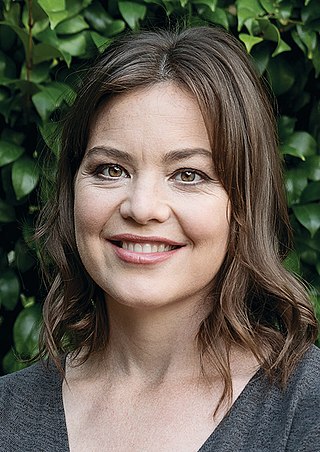
Julie Anne Genter is an American-born New Zealand politician who is a member of the House of Representatives representing the Green Party of Aotearoa New Zealand. Genter was elected to each Parliament from 2011 to 2023 on the party lists,before being elected as the Member of Parliament for the Rongotai electorate in the 2023 election. She served as the Minister for Women,Associate Minister for Health and Associate Minister for Transport during the first term of the Sixth Labour Government. She holds dual citizenship of New Zealand and the United States.

James Peter Edward Shaw is a New Zealand climate activist,businessman and former politician. He was a Member of Parliament from 2014 to 2024 and a co-leader of the Green Party of Aotearoa New Zealand from 2015 to 2024.
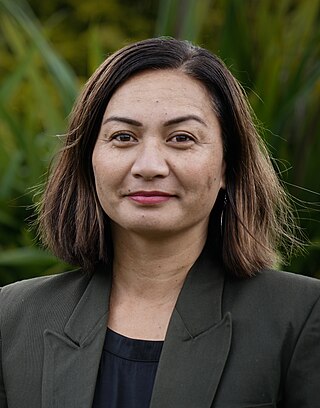
Marama Mere-Ana Davidson is a New Zealand politician who entered the New Zealand Parliament in 2015 as a list MP representing the Green Party of Aotearoa New Zealand,of which she became the female co-leader in 2018.
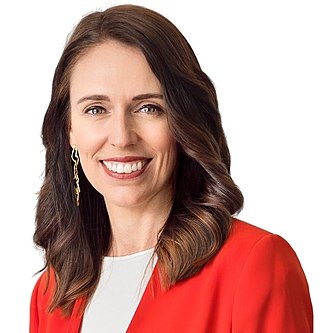
The 2020 New Zealand general election was held on Saturday 17 October 2020 to determine the composition of the 53rd New Zealand Parliament. Voters elected 120 members to the House of Representatives,72 from single-member electorates and 48 from closed party lists. Two referendums,one on the personal use of cannabis and one on euthanasia,were also held on the same day. Official results of the election and referendums were released on 6 November.
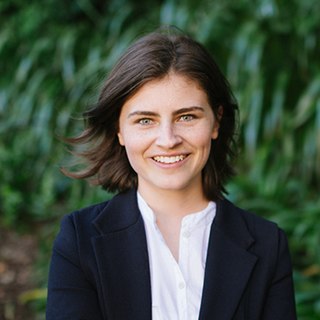
Chlöe Charlotte Swarbrick is a New Zealand politician. Following a high-profile but unsuccessful run for the 2016 Auckland mayoral election,she became a parliamentary candidate for the Green Party of Aotearoa New Zealand,standing in the 2017 New Zealand general election and was elected as a member of the New Zealand Parliament at the age of 23. In the 2020 election,Swarbrick was elected as the Member of Parliament for Auckland Central,becoming the second Green Party MP ever to win an electorate seat,and the first without a tacit endorsement from a major party leader. She retained Auckland Central in the 2023 election. In March 2024,she was elected co-leader of the Green Party.
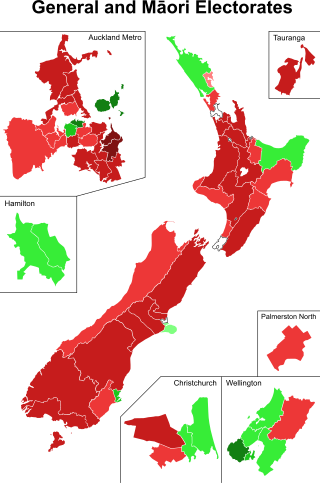
The 2020 New Zealand cannabis referendum was a non-binding referendum held on 17 October 2020 in conjunction with the 2020 general election and a euthanasia referendum,on the question of whether to legalise the sale,use,possession and production of recreational cannabis. It was rejected by New Zealand voters. The form of the referendum was a vote for or against the proposed "Cannabis Legalisation and Control Bill". Official results were released by the Electoral Commission on 6 November 2020 with 50.7% of voters opposing the legalisation and 48.4% in support.

Elizabeth Anne Kerekere is a New Zealand politician and LGBTQ activist and scholar. She was elected a member of parliament for the Green Party in 2020,but resigned from the Greens on 5 May 2023,following allegations of bullying within the party. Kerekere remained in parliament as an independent until the 2023 election.

Abraham Gabriel Gray is an American-born New Zealand cannabis activist,politician and founder of the Whakamana Cannabis Museum,New Zealand's first and only cannabis museum. Gray was a University of Otago lecturer and tutor for over a decade before founding the museum.
Taitoa Wihone is a New Zealand environmental activist and political candidate.
This page lists candidates contesting electorates in the 2023 New Zealand general election.
References
- ↑ "Green Party Contacts | Green Party of Aotearoa New Zealand". Greens.org.nz. Retrieved 27 February 2009.
- ↑ "Green Party Organisation | Green Party of Aotearoa New Zealand". Greens.org.nz. Archived from the original on 31 January 2009. Retrieved 27 February 2009.
- ↑ "Election 2011: Key hails National victory". 27 November 2011.
- ↑ "John Armstrong: Greens want serious tilt at power".
- ↑ "New Zealand Parliament – Ōhariu: Electoral Profile". Parliament.nz. 15 March 2008. Retrieved 27 February 2009.
- ↑ "Green Party unveils "real" list – TVNZ Portable". tvnz.co.nz. 26 June 2002. Retrieved 27 February 2009.
- ↑ "New Zealand Parliament – Volume 612, Week 40 – Tuesday, 21 October 2003". Parliament.nz. Retrieved 27 February 2009.
- ↑ "Land Transport Management Act 2003 No 118 (As at 23 February 2022), Public Act Contents – New Zealand Legislation".
- ↑ "Te Aro's slow recovery from bypass surgery". 4 September 2010.
- ↑ "Cannabis Inquiry 03; NORML New Zealand". NORML New Zealand. Archived from the original on 27 July 2011. Retrieved 24 November 2009.
- ↑ https://www.caha.org.au/mr_190122